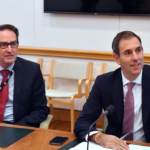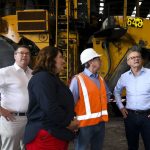Looking beyond the referendum

It is likely that the referendum to enshrine in the Australian Constitution an advisory body (The Voice) to the Federal Government will be defeated. Already the recriminations have commenced regarding this setback in the aim of improving the welfare of indigenous Australians.
Frankly, we all need to look beyond Saturday but not just for the purpose of assigning blame for the failure of the referendum.
Yes, No, and Maybe
For myself, I began as a Yes and then became a No before finally deciding to vote Yes. This all means I have done some serious thinking about what this vote is about.. This is not the case for all of us. I would categorise the Australian voter as being in three categories – passionately Yes, reasonably Yes or No and unengaged and largely No. Let me describe these categories a little more.
Passionately Yes – is most of those who believe that it is time our indigenous peoples were given due recognition that they were here long before any immigrant Australians arrived and that their traditional lives were irreversibly damaged by colonisation. This group includes many of those younger than 40 and many of those with a university education but this support is not exclusive to these groups.
This group strongly believes that a Voice mechanism is important enough that it should be enshrined in the Australian Constitution. A major reason for this view is that it has been a specific request of indigenous Australians, as drawn from the Uluru Statement from the Heart. The underlying intent of this “request” is to ensure that the future decisions made that relate directly to indigenous Australians have the highest form of input from indigenous Australians.
Reasonably Yes and No – these are people from many walks of life. I don’t have a particular handle on their profile but we will, no doubt, know in the full course of time. I include myself in this group. There are several factors influencing this group. Some would have the view that enshrining a representative Voice for indigenous people in the Constitution is a divisive act in that it singles out one group for special treatment. Others would consider including reference to a Voice in the Constitution is wrong without voters knowing exactly what the form of this advisory body will take, it’s likely effectiveness and so on.
I speculate, but those who have switched from No to Yes have done so because they have decided, uncertain as the process is at this stage, that it is important we address the questions of indigenous disadvantage holistically and that we won’t do this without indigenous Australians becoming much more responsible and accountable for what is done with regard to their welfare.
Unengaged No – these are people who haven’t given this matter a lot of thought and because they know very little about why it is being proposed, their tendency is simply to vote No. Given that the political leadership of Australia is divided on this matter, this group was guaranteed to be a significant one. I don’t know anything much about the demography of this grouping except they would be mostly not politically engaged.
I suggest that all three “positions” have a degree of rationality that is not being recognised in the Australian media. As an example is the following statement from one commentator who is clearly a supporter of the Voice:
“The media is responding to the debate largely in ideological terms. One of the impressive things about the referendum proposal is that it offers to do so much. It offers a clear, comprehensible way to improve lives: just listen to Indigenous people.”
The Elephant in the Room
Apart from the clear message that the Voice is right for us this statement alludes to what could be called the elephant in the room. This is that there has not been a substantive engagement between indigenous and immigrant Australians on the matter. The commentator appeals to immigrant Australians to, “just listen to indigenous people.” It would be much better if this was expressed as an engagement and dialogue between indigenous and immigrant Australia.
For many in immigrant Australia there is little understanding of the difficulties arising out of indigenous dispossession. Even more important is that there is insufficient recognition that these difficulties are any different to those of the various immigrant groupings and why they should be regarded as unique enough to have a Voice for dealing with them enshrined in the Australian Constitution. Immigrant Australia, in responding No in a clear majority to the referendum, would be saying they are not convinced that such special treatment is justified.
A Lack of Political Leadership
This brings me to the question of political leadership or perhaps more specifically lack of it. The political Left will be saying that the referendum was in accordance with indigenous Australia’s wishes and that it wasn’t their place to tamper with how the Voice should be presented in the referendum. My view is that this is actually lack of political leadership because indigenous Australia should have been strongly advised not to seek the Voice as a constitutionally enshrined body.
Could not the Government had said, “look, this won’t get up, let’s try a different path”? Equally the political Right needs to be asked, “you have chosen to reject this path, what’s next and how are we going to get indigenous Australia’s buy-in to a more effective and accountable means for achieving improved indigenous Australian welfare? Having another referendum only on recognition, as suggested by the leader of the Opposition, is at best treading water and at worst disingenuous.
The reason why I eventually decided to vote Yes is because we must be braver in promoting change. Yes, there are risks that despite all best efforts, the Voice could be ineffective, but so what? If it isn’t particularly effective then it can be tweaked. I suggest Australia, in rejecting this propose will be taking the path of fearing change because it is just that.
It is now confirmed that the Government will not proceed to legislate on the Voice because to do so would be against the wishes of the people. I consider this a cop-out because the Voice referendum is not about a need for the Voice but rather whether it should be enshrined in the Constitution. Why would the Government need a vote to justify legislation? Having platforms for representation to parliament is a bread-and-butter political device so I see reluctance to legislate as yet further leadership timidity.
The media commentators are already gearing up to attack the political leadership on the likely failure of the referendum. This is also wrong. The issue was and remains that much of Australian society is not committed to fixing what is a very complex problem. Regretfully there is a portion of our society that is without understanding or empathy for the plight of indigenous Australians. Added to this is that there is not one plight but many and they tend to need differing representation.
All this tells me, as I have highlighted above, that there is a gigantic need for greater engagement between immigrant and indigenous Australia. There are other delineations of our society and these can be recognised as discourse proceeds but first let the dialogue be between immigrant and indigenous Australia and, as far as possible, with a much more effective input from politicians and the media.
Both the politicians and the media have failed us so far and whilst they are both an essential component of future engagement we cannot really trust either of them that much given their performance to date.
Bernie O’Kane has a background in urban infrastructure investigation, planning, design and construction. He has worked in both the public and private sectors in Australia, Hong Kong, Malaysia, Indonesia and Vietnam, and has a Masters in environmental planning and water resources from Stanford University.














Max Thomas
October 12, 2023 at 3:07 pm
Prime Minister Albanese says that if the referendum fails, he won’t legislate for a Voice to Parliament. But if the referendum passes, the head of power for the Voice would be the constitution (as amended). In all other respects, it would be the same or very similar to a legislated advisory body. In either case, the enabling law would be subject to scrutiny of the Senate and would require the assent of the Governor-General.
The Parliament (government of the day) could not abolish a Voice established by amendment of the constitution. However, it could restrict its future operations by financial or regulatory means, just as it could do with a legislated advisory body. With or without a constitutional amendment, legislation would be required to establish an advisory body, and to appropriate funds for its establishment, operations and regulation.
The constitution requires that appropriation of funds cannot be made other than by law. Legislation relating to an advisory body would also be subject to government fiscal policy and the budgetary estimates process.
I have great respect for Noel Pearson, a leading architect of the Uluṟu statement. Mr Pearson said that Australia must reach a point in its relationship with Indigenous people “where it is legitimate to blame us”. The Voice is a way of “claiming the right to take responsibility,” he said.
Mr Pearson has advised the “Yes” campaign to elevate the goal of recognition of Indigenous Australians over the creation of the Voice. A separate referendum question to formally recognise Aboriginal and Torres Strait Islander peoples in the constitution might have been another step on the way to self-determination. Ironically and regrettably, it seems that the government wasn’t listening.
This lack of forethought, at least in part, is how the government created the present situation by unwisely conflating separate questions. John Howard did that with the republic referendum, except that it was intended to produce the outcome he wanted. That lesson was evidently lost on the Albanese government.
The present administration or a future government may have to revisit the idea of a legislated advisory body consisting of Aboriginal and Torres Strait Islanders.
The National Indigenous Australians Agency (NIAA) was formed in 2019 by the Morrison government. It has a budget of around $2 billion and employs around 1,300 people, more than 20% of whom identify as Indigenous.
The NIAA website states: “The National Indigenous Australians Agency works in genuine partnership to enable the self-determination and aspirations of First Nations communities. We lead and influence change across government to ensure Aboriginal and Torres Strait Islander peoples have a say in the decisions that affect them.”
The annual ‘Closing the Gap Report’ shows that a number of Gap indicator targets remain unmet. It is too soon to evaluate whether or not the NIAA has been able to make progress towards meeting those targets. Presumably, the recommendations of a future advisory body would be implemented by the NIAA.
The term bureaucracy literally means “rule by desks.” A primary concern of bureaucracy is its own survival and expansion.
It is interesting to speculate on how the NIAA and government would respond if a future Voice or advisory body were to recommend a program, based on achievement of measurable ‘Gap’ indicators, to progressively replace the NIAA with decentralised, Indigenous self-governance.